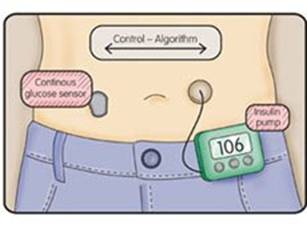Scientists from the Cambridge University have developed a new device to manage type 1 diabetes. This so called “artificial pancreas” system when used overnight can significantly reduce the risk of hypoglycemia (glucose levels dropping dangerously low) while sleeping.
The aim of the study was to establish whether closed-loop insulin delivery could control overnight blood glucose in young people. In this new study a group of 17 children aged between five and 18 were studied over 54 nights. They had compared standard continuous subcutaneous insulin infusion and closed-loop delivery; closed-loop delivery after
rapidly and slowly absorbed meals; and closed-loop
delivery and standard treatment after exercise.
Allocation was by computer-generated random code. Participants were
masked to plasma and sensor glucose. Investigators were
masked to plasma glucose. During closed-loop nights, glucose
measurements were fed every 15 min into a control algorithm
calculating rate of insulin infusion, and a nurse adjusted the insulin
pump. During control nights, patients' standard pump settings were
applied.
Lead author Dr Roman Hovorka of the Institute of Metabolic Science at the University of Cambridge said: “Our results show that commercially-available devices, when coupled with the algorithm we developed, can improve glucose control in children and significantly reduce the risk of hypos overnight .
|
 |

